Samsung Galaxy Nexus & Ice Cream Sandwich Review
by Brian Klug & Anand Lal Shimpi on January 18, 2012 1:34 PM ESTBattery life remains the other big axis on which smartphones are judged, and here we've turned to our regular 2011 suite of battery life tests to see how the Galaxy Nexus shakes out. Our battery life testing consists of a page loading suite which loads through a few dozen pages endlessly on both WiFi and cellular data until the phone dies, with the display set at 200 nits. For the cellular tests, we're always careful to test in cellular environments with decent signal (at least -75 dBm or higher) as well, since that's a factor. Next is a simple call test where we play music at both ends of a call until the device under test dies, and our final test is a WiFi hotspot workload which consists of four page loading tabs and a 128 kbps streaming MP3 station that runs until the phone dies.
First up are the web browsing tests over cellular 3G; this means EVDO Rev.A for the CDMA/LTE version, and WCDMA T-Mobile for the GSM/UMTS device.
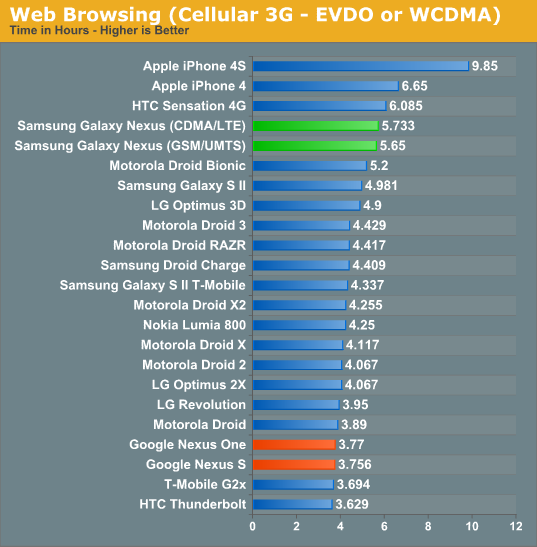
The Galaxy Nexii both do surprisingly well. I'm actually very impressed with how long the devices lasted subjectively on 3G and this definitely backs that up. Of course, both devices include beefy batteries, but Samsung has done a nice job thus far including big batteries without making devices bulky or heavy.
Next up is the same test, but on 4G LTE for the CDMA/LTE variant.
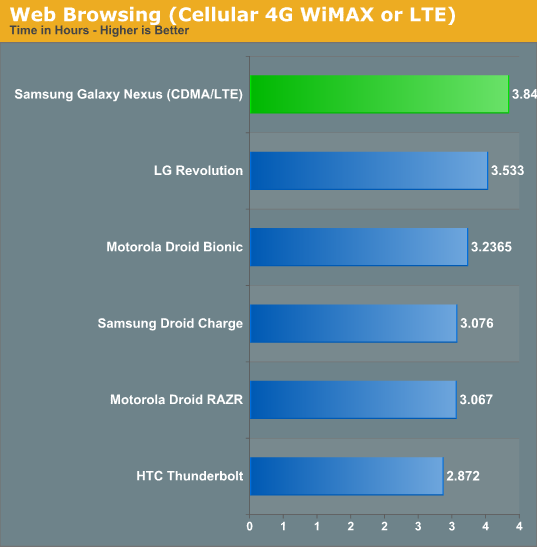
The Galaxy Nexus doesn't post numbers very far in front, but manages to come in the top of the pack on 4G LTE at just under 4 hours. This is a pretty impressive result, honestly, considering that CMC221 is likely made on the same 45nm manufacturing process as CMC220. Again, I'm impressed with the Galaxy Nexus' longevity even on 4G LTE.
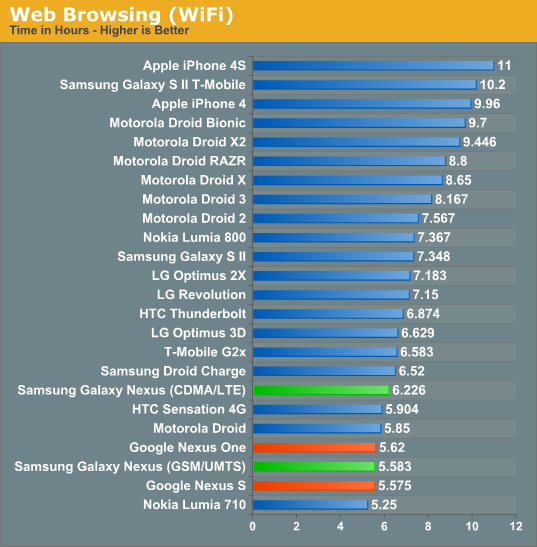
Surprisingly, the Galaxy Nexus can't break past that 6 hour mark even on WiFi, however, which does lead me to think we might be constrained by driving that display.
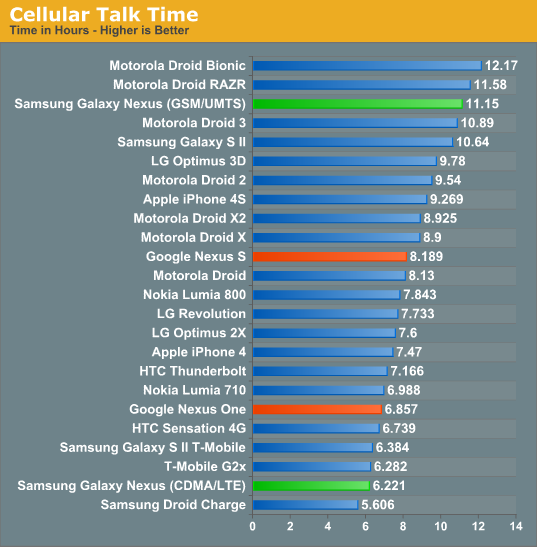
If you ever wanted to see how much difference having a different cellular architecture makes, see above. The GSM/UMTS Galaxy Nexus lasts impressively long on a voice call, at over 11 hours, yet its CDMA/LTE brother lasts just over half that.
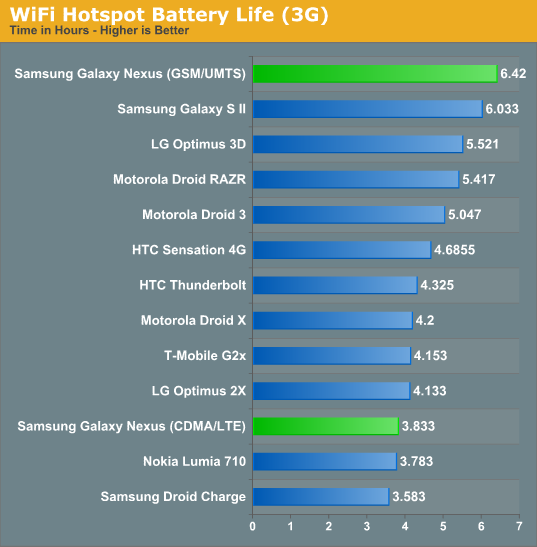
WiFi hotspot on 3G tells the same story - I'm not sure what Via Telecom's CBP7.1 draws in its active state for EVDO or 1x voice, but it seems to eat up more power than the XMM 6260 (X-Gold 626) in the GSM/UMTS Galaxy Nexus.
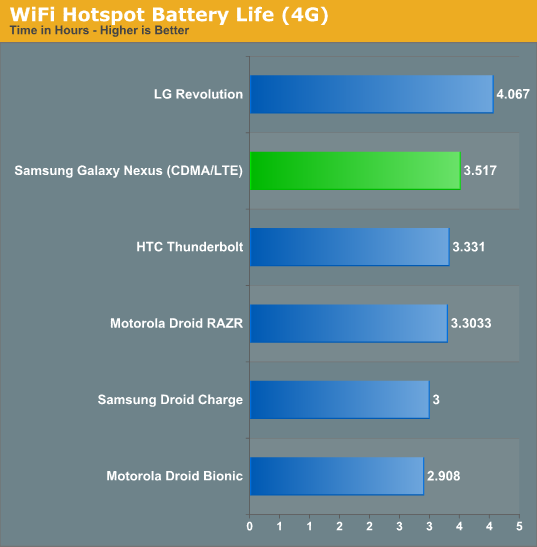
As a 4G LTE WiFi hotspot, the Galaxy Nexus loses its edge over the Revolution, but does come in just ahead of the rest of the 4G LTE herd.
The story of battery life on the Galaxy Nexus unsurprisingly depends on which variant you're talking about. For a phone with a 4.65" display, I'd say I'm impressed with the battery life on both devices - remember that the area that needs to get lit up goes as r^2 - increasing that and not killing the battery is a big feat. In addition, I'd wager that using the OpenGL ES renderpath (and accelerated browser in 4.0) definitely helped both Galaxy Nexus devices post impressive scores. As for the two variants, the GSM/UMTS device has impressively long battery life pretty much across the board. Playing with that phone, I was rarely wanting for more on my regular use schedule (I charge at night on my nightstand). We've seen XMM6260 before in numerous devices where it seems to be a pretty good citizen.
The CDMA/LTE variant, on the other hand, depends strongly on what air interface you end up using most - on 4G LTE the device comes in at the front of the pack usually, and its 3G web browsing test is above average. However, if you make a lot of voice calls, the phone might not cut it. Unsurprisingly the CDMA/LTE Galaxy Nexus does nothing to dramatically change 4G LTE battery life - for that we're still waiting for upcoming 28nm LTE basebands.










185 Comments
View All Comments
gamoniac - Wednesday, January 18, 2012 - link
The article is co-authored, yet I keep seeing the use of "I" as the pronoun in sentences throughout. As a daily AT reader, I find it a bit awkard when trying to put a face to the article. I like the writing style; it just bugs me when I can't figure out whether it is Anand or Brian who is making the statement that I am reading. Perhaps the use of "we" makes more sense?Thanks. Great work as usual.
Omid.M - Wednesday, January 18, 2012 - link
As an editor, I agree with this comment.It's not a huge deal, but it's nice to see:
AL: I think that...
BK: I disagree with Anand, but...
Just don't do it everywhere because it'll seem like an interview.
Anand,
The videos have been the best new thing AT has done in a long time. Thanks! Good to put faces to names, even better to add voices. Next, comment system ;)
@moids
-Omid
bjacobson - Wednesday, January 18, 2012 - link
Perhaps writers at Anand should be required to speak in terms of The Collective.Brian Klug - Thursday, January 19, 2012 - link
This is definitely something we've struggled with in the past and admittedly continue to struggle with. Most of ICS is Anand (though we collaborated and always wind up agreeing about most things), then the hardware and onwards is myself.Think of us as a hivemind (or collective) and the problem goes away :P
-Brian
Zoomer - Thursday, January 19, 2012 - link
Or write in 3rd person like a technical paper. Though that can be boring to read.just4U - Friday, January 20, 2012 - link
"Think of us as a hivemind (or collective) and the problem goes away :P-Brian"
------
It does NOT!! Ok, which bonehead asimilated Brian & Anand? There goes the neighborhood (...grin)
thebitdnd - Wednesday, January 18, 2012 - link
I've had my GNex since the day after launch. It surpasses any experience I've had with a smartphone (including HTC Incredible, iPhone 3GS, and a HTC EVO) as a web browser and mobile computer device, but the single complaint I have is with using it as a...(wait for it) PHONE.I've had over a dozen calls now where I'll be conversing away and all of the sudden my microphone cuts out and the other person can't hear a word I'm saying. The call is still connected and I can hear them just fine, but I have to hang up each time and call them back.
Google directed me to Verizon, Verizon says it's a Samsung/Google problem, but I've been assured it's a software problem and there will be a fix in 'an upcoming update'.
As much as I like the hardware and software, not making reliable calls is a real kick in the junk for a smartphone.
jalexoid - Wednesday, January 18, 2012 - link
Well, what did you want with CDMA or LTE? No bugs?mhaager2 - Wednesday, January 18, 2012 - link
Great review as always Anand. My only criticism is that it felt like it took you a very long time to get this review out compared to how quickly the iphone 4S review came out. I think your comments about the hardware are correct; its certainly not leaps and bounds ahead of other phones. Being my first phone since the iphone 3G I do wish it was more bleeding edge to future proof it a bit. However it actually works very well, both as a content consumption device, as well as (gasp) as a phone, and I just love, love, love that fact that its penta band. Now when I visit the US I no longer have to endure the legal extortion that used to be the norm with carrier locked devices. That feature alone makes this phone better than any other out there,, old GPU and all.Has anyone overclocked this to its 1.5 ghz spec? I wonder if there is any appreciable differerence and what the battery life trade off is.
tipoo - Wednesday, January 18, 2012 - link
I can only speak from my experience with my Nexus S, but the max CPU speed has little battery life impact compared to the impact the CPU governor does. 1.3GHz with the Lazy governor (available in Trinity Kernel) lasts longer than the stock 1GHz on OnDemand.